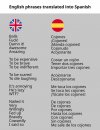addedc
Experienced
I speak passable Japanese and just learned that one way to say cross-eyed in Japanese is "Rompari" (sort of rhymes with Lombardi). What that literally means is "Rome/Paris," i.e. one eye looking at Rome, the other at Paris. That struck me as the funniest use of language I have heard but I am sure many of you can top it.





